- Home
- Andrew McGahan
1988 Page 21
1988 Read online
Page 21
He nodded, stared off. There were a couple of battered bags at his feet. I wondered where he had come from, why he was here. Time passed in silence. I stood there. Was I supposed to be doing something?
I said, ‘Uh . . . would you like a beer?’
‘Beer?’ He measured me up again. In some way I must have been satisfactory. ‘Yeah. Thanks.’
We sat on the steps and drank slowly. The house and the compound and the lighthouse, they were all fading back to normality. There were no noises, nothing was watching me. The generator was a distant hum. I sipped from the can. I thought about the night before, at Vince’s place. I’d left bloodstains on his couch. I’d left my shirt there, books all over the floor.
I stopped thinking about it. I waited. Allan Price didn’t speak, didn’t even glance at me. I thought of things to say, didn’t say them. Finally he took a long pull from the can and smacked his lips. He sighed, looked at me. He’d come, he said, from a Land Council meeting down in Arnhem Land. He hadn’t been around Cobourg for several weeks. That’s why he was out of touch.
‘The others are due back in a day or two,’ I said.
‘Don’t matter. I’ll get Russel on the radio. Get him over with a boat. How you bin going here?’
‘Oh. Good.’
‘You like Cobourg?’
‘I haven’t seen much. Only around the lighthouse.’ I remembered who he was. ‘It looks like good land though.’
‘Oh yeah, good land. Good life. Where you from?’
‘Brisbane.’
He nodded. ‘Bin there. Canberra too. Sydney. Did the whole bloody tour, talkin’ to authorities. When we were settin’ this place up.’
‘The national park?’
‘Uh-huh.’
‘You were on Croker Island before that, weren’t you?’
‘Croker. Meningrida. All over. Used to live right here even. You seen those old shacks down in the bush? We lived down there.’
‘Vince told me. He said they had a school in this house.’
He laughed. ‘Shit yeah. Never did much good. Kids were wild, y’know.’
I got more beers. Allan seemed in a better mood. I felt better myself. Dazed, but functioning. I asked him questions about Cape Don, the compound, the house. What else did he remember?
He remembered the old lighthouse-keepers. Who they were, how they’d spent their time. How two of them had once gone wild, duelled it out with rifles. Sex was the problem. One of them had caught his wife fucking the other one on the lighthouse steps.
‘Anyone get killed?’
‘Nah. Hopeless bloody shots. Then the wives stepped in. They were big women, them wives. They nearly killed each other.’
He remembered the army too, during the war. How he and his people would swap meat and wild honey with the soldiers for their rum. How the gunners would lob shells out at the reefs, for practice.
‘What about the men who disappeared.’
He shook his head. ‘We looked. Followed their tracks to a swamp. After that, nothin’.’
I listened, felt all the tension draining away. Allan wasn’t what I’d been expecting. There was still a severe and ominous air about him, but it wasn’t directed at me. He seemed to appreciate the questions, enjoy the stories. He chain-smoked his rolled cigarettes, coughed occasionally, spat. I smoked my Winfield Blues. Felt sane again. The beer ran out. I’d drunk most of it over the last few days. Allan stood up. An hour or so had passed.
‘What you doin’ now?’ he asked.
‘Nothing.’
‘Come on down the bush then. I’ll show you these shacks we had. Haven’t bin there in a while.’
‘Uh . . . if you want. You sure you don’t have other stuff to do?’
‘Nah. I got plenty of time.’
I put on some shoes. I realised it was almost midday. I remembered the weather. I’d missed the last three observations. I explained this to Allan. He waited while I did the readings. On the radio the Darwin operator asked what had happened to me, where’d I’d been. She sounded concerned. I made excuses. Then I followed Allan down off the plateau into the scrub.
We walked. It was strange. Twenty-four hours earlier this would’ve been impossible. A nightmare. And I still had the boils and I still needed sleep, but everything had changed. I stumbled after Allan through vines and low bushes and rough clearings of broken stone, and felt good. Confused about exactly where we were headed, or how far away it might be, or what we would do when we got there, but good.
Allan set a steady pace. He moved easily, despite his age and bare feet and eternally lit cigarette. The plateau fell well behind. We were in level, thick forest. Away to the right I caught glimpses of the ocean. Even the sand of a beach. It was a different world. Fertile, tropical, almost rainforest. Birds called and things scampered away in the undergrowth. I asked Allan about giant lizards.
‘Saw one eh?’
‘Yes. At night. Near the weather shack. It was bigger than I was.’
‘That big? Must’ve been an old fella.’
He seemed to think it was no great event. Finally we came across the shacks. There were three of them, tin roofs and tin walls. They were old, rusted, leaning. The ceiling of one had collapsed. Vines and trees swathed them in greenery. There were a few drums around, some bottles, nothing else. Allan was wandering from shack to shack, peering in, shoving branches out of the way.
‘How many of you lived here?’ I asked.
‘Thirty. Forty.’
‘Bit crowded.’
‘Only went inside in the wet. Slept out bush in the dry.’
‘Why here?’
‘Nowhere else we were allowed to go. Government made this a reserve. They wanted us kept outta the rest of the place. Dunno why, they didn’t know what to do with it. We could buy flour off the keepers up at the lighthouse. Some of them were okay. Then they took the lot of us over to Croker. That was that.’
I looked in the shacks. They were small and dark and festooned with webs. One still contained a three-legged table.
I said, ‘At least you’ve got it all back now.’
He shrugged, nodded. ‘Too late for some of this lot though. Died over on Croker.’
I fell silent. There was little else to comment on. Whatever had been there was gone. Except for Allan himself and the things he remembered. And whatever those things were, or what they meant, he didn’t say. After a time we headed back.
‘How long you here for?’ he asked me, when we were almost home.
‘Under two months left now.’
‘That all?’
‘It was only a six-month job.’
‘But you can stay longer, if you want.’
‘I suppose we could.’
He thought for a while. ‘Well, you come over to Araru. Take a look.’
‘Araru? Me?’
He nodded, serious. ‘Gotta see the place, meet a few people. No good stuck over here.’
‘When?’
‘When the others get back. You can come with me and Russel.’ He looked at me over his shoulder. ‘You don’t look too good. How long you been alone here?’
‘Not much more than a week. I don’t think I handled it too well. I’m not used to isolation.’
‘This place . . .’ He shook his head. ‘Russel shoulda known. Round here, not a good place to be alone, a bloke like you. Bad things eh. Make you go crazy.’
‘Seriously?’
He paused. ‘When you come out this morning, looked like you thought I was a ghost.’ He laughed, began climbing up the hill to the lighthouse.
Allan went off to Russel and Eve’s house. He said he planned to sleep. I went back to my own place. I cooked myself a big meal of steak and vegetables and orange juice. I showered, squeezed one of the boils. I found a razor and shaved off the beard. Then I slept, six hours straight. It all seemed simple. I woke up around nine, did the observation. There were lights on over at Russel and Eve’s house. The place was occupied again.
And I had onl
y one more night, then hopefully Wayne would be back. Maybe Allan was right. Maybe Cape Don was an evil place to exist alone. On the other hand, maybe it was just lack of sleep and the boils and too much alcohol, too much pot. When I thought about it, nothing else had changed. My life was still going nowhere. I wasn’t going to do any writing. I didn’t even want to do any reading.
The sense of relief faded. Depression returned. Things weren’t going right here, it’d been a mistake to even come. I wanted to get back to Brisbane. Back to the pubs and television and old friends. Back where I didn’t get boils and the only sounds at night were traffic and police sirens and the Chinese talking. But it was all still months away.
Next morning I went over to Vince’s house and cleaned up the books. I flipped the couch cushions over to hide the spots of blood. They weren’t as bad as I’d thought anyway. A few hours later a plane did the circuit. Allan came out of his house and watched it too. Together we drove out to the strip. The plane was waiting there. It unloaded both Vince and Wayne. They squinted in the sun, looked exactly the same as when they’d left. My family.
Vince was surprised to see Allan. We all got in the car, drove back to the lighthouse. Vince and Allan talked in the front, Wayne and I sat in the back. Wayne was silent. Staring out the window.
‘So how was Brisbane?’ I asked.
He thought. ‘Really weird. It felt all wrong. I couldn’t relax.’
‘Who did you see?’
‘Madelaine. She asked how you were. Everyone else. They kept on wanting to know what Cape Don was like, what we’d been doing. I couldn’t tell them anything. I dunno why.’
‘What about the award dinner?’
He shrugged. ‘I mean, it made no sense to suddenly be at something like that after being here so long. And I’d forgotten how bad my painting was. It was shit, the whole thing. How did you go here?’
‘I lost it a little. Before Allan showed up. What about the prize money? That must have been okay.’
‘Yeah, that was okay.’
But he didn’t sound convinced. He went back to looking out the window. I was surprised. How could he have not enjoyed Brisbane? Brisbane was everything.
We got back to the compound. Allan went into Vince’s house to use the park radio. He was making his call to Russel, organising a boat. Wayne and I stayed outside with Vince. He seemed tired. Depressed.
‘I might as well tell you Gordon,’ he said, ‘I’ve already told Wayne. I’m not leaving.’
‘What happened?’
‘They said they appreciated my situation, but that there were no other positions open and that no one wants to replace me here. I’m not surprised. Word’s got around. Stay the fuck away from Cape Don.’
‘So what happens now?’
‘Another six months at least. Maybe a year.’
‘I’m sorry,’ I said. And I was.
He sighed. ‘At least I might get the cruiser now. They know I’m pissed off. I said that if the cruiser wasn’t here within three months I was quitting, regardless. They promised it would be. And new parts for the generator.’
‘Do you believe them?’
‘No.’ He made an effort, became a ranger again. ‘So, any problems here while I was gone?’
‘Russel had to leave, but that was all. I didn’t break anything.’
‘Did you get all the weather?’
‘No.’
He nodded. ‘No one can. I nearly went mad when I tried to do it alone. Believe me.’
‘I do.’
Allan came out. He’d tracked Russel down at Croker Island. The cousin there wasn’t dead yet. Russel would have time to come over with the boat next day, pick up Allan, then spend a day or so at Araru. He looked at me.
‘You feelin’ better yet?’
‘Sure.’
‘You’ll be coming too then.’
It wasn’t a question. He was the man in charge, and he’d made the decision. For some reason, after that one afternoon we’d spent together, I was wanted.
THIRTY-FIVE
By late next morning Allan and I were packed and waiting down at the bay. I’d borrowed a sleeping bag from Vince, thrown a few other things together. Asthma drugs, cigarettes, a half-full cask of wine. I wasn’t sure how long I’d be gone. Allan didn’t say, I didn’t ask. It seemed best not to worry. Russel and Eve arrived about noon, ran the boat up on the beach. They nodded at me. I assumed they’d known I was coming. Allan and I loaded in, and we shoved off. We headed east, out of the bay, into the ocean.
The day was sunny and blue and warm. The boat powered up to speed, bucked across the waves. I looked back, watched the lighthouse fall away behind. With it went Cape Don, the houses, the writing, the observations, everything. It was a failure and there was nothing much left to be salvaged, but at least I knew that much now. Things could progress. I was finally heading somewhere different.
I lolled in the stern and lit a cigarette. I watched the ocean and the coastline, blew smoke into the wind. This was what smoking was for. Travelling. Eve was also sitting in the stern. She seemed cheerful. She looked across at me and actually smiled. It was quick and small, but it was there, and it made her face almost unrecognisable. I wasn’t sure what to do. I smiled back. Allan, standing with Russel at the wheel, called me forward.
‘You see that?’ he said.
He was pointing to a large reef. I nodded.
‘Crab dreaming place,’ he said, ‘Lots of dreaming places around here. Dingo, stingray, snake.’ He waited, watching me. ‘You know what dreaming is?’
‘No. Not really.’
‘Cape Don. That’s a dreaming place.’
‘Yeah?’
He laughed. ‘Yeah. Big lizard dreaming.’
‘You’re kidding.’
‘No, no joke. You know. Mean old fella, big lizard. Plays tricks in your head. But Cape Don’s not so bad. Some of these other places around, they’re more dangerous. Only Gurig go there. No rangers. No tourists.’
I nodded.
He looked at me seriously. ‘If I show you, you’ll stay away then eh?’
‘Of course.’
He was satisfied. He began pointing out places along the coast, explained a little of what they meant to the Gurig clans. It wasn’t exactly secret knowledge. There was a map on Vince’s wall, back at Cape Don, which marked some of the more sacred areas, along with warnings to stay clear. Anyone could read it.
And Allan was only talking in general terms. First he showed me a large, forested point of land, surrounded by reefs. Somewhere back in the bush was a giant banyan tree. It was an earthquake spirit tree and would cause disaster if interfered with. The Cobourg Peninsula did get earthquakes from time to time, Allan said, but only small ones. The last big one had happened before he was even born. And only he and Russel knew exactly where the tree was.
Then there was a long white beach that had an influence on the weather. If someone drew certain signs in a certain place in the sand, strong winds would blow. Even worse, placing a banyan stick in the sand and talking to it in a certain way would cause the skies to darken and a cyclone to come. Very few people knew the words or the signs, but the beach itself was still forbidden.
‘Have you ever called a cyclone?’
He smiled at me. ‘Don’t think I could eh?’
‘I dunno.’
‘No, I never called one. Big things cyclones. But one was called, once. By mistake.’
He explained. It had nothing to do with the beach. An important set of rocks on another part of the coast had been interfered with. A woman visiting from another tribe had been searching for oysters there, not knowing the law. The cyclone that came was heavy with rain and the Peninsula was severely flooded. Deaths occurred. And it was all long, long ago.
‘You know, I’ve seen some of these places on a map,’ I said, ‘At the ranger station.’
‘Yeah, we made that map. For the rangers. It’s all these tourists. They don’t know anything.’
And there
would be more tourists soon. He told me that the park board had recently voted for the building of a small resort. It was over on the east side of the Peninsula, not far from the present camping grounds. Room for maybe twenty or thirty visitors.
‘You don’t mind people coming?’
‘No. Long as it’s done right. Our people need the jobs. This resort, it’ll be run by us. We’ll give ‘em tours. And there’s a bit of white history around too. People should see it.’
‘The settlements?’
I knew, from the maps, that further along the coast there were ruins from the colonial days. There had been two attempts by Europeans to settle Cobourg in the early 1800s. They were amongst the first white settlements in the whole of Australia, outside of Sydney. Long before Darwin was founded. When the whole northern half of the continent was still unknown territory. Both had failed utterly in the face of starvation and disease and Gurig resistance. Apparently there were still a few buildings and foundations left, fireplaces, junk, some gravestones.
Allan nodded. ‘Cyclone got ’em. Lot of them died. They waited for more people to come. Nothing. So they went home. Lucky for us.’
‘I guess so.’
‘There’s others too. You heard about the Macassans? They were coming here before Captain Cook even.’
Vince had told me a little. Muslim fishermen from the city of Macassar, in what was now Indonesia, had been visiting the peninsula decades earlier than any whites. They were hunting trepang. Sea slugs. They sold them in China, where they were a delicacy.
‘They camped along the coast,’ Allan said, ‘You can see where. We still got stories about ‘em. They stayed here for months sometimes. They weren’t like the whites. They only wanted sea slugs. It was all friendly.’
‘Vince told me some of your people even went back overseas with them.’
‘Yeah. This one bloke, he went. Got another boat from there, kept going. Ended up in England. Came back years later. Spoke English. Before any whites even got here. You believe that?’
‘It’s a little hard.’
‘True though. You’re a writer. Write a book about him.’
Then Eve was yelling and pointing out to sea. I looked but couldn’t see anything. Russel and Allan could. Russel turned the boat.

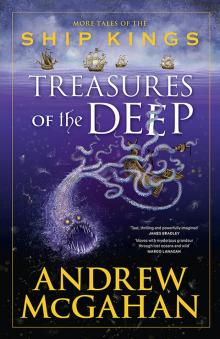 Treasures of the Deep
Treasures of the Deep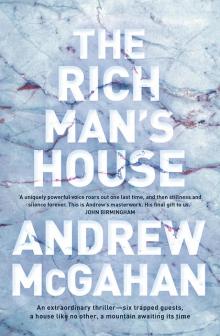 The Rich Man’s House
The Rich Man’s House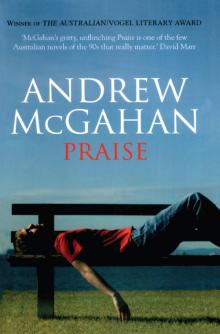 Praise
Praise The White Earth
The White Earth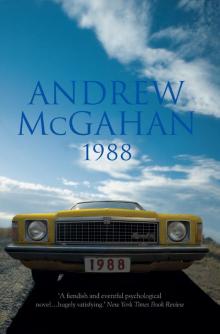 1988
1988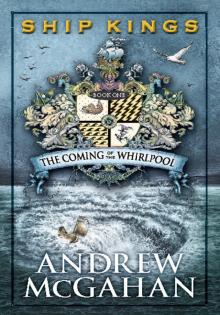 The Coming of the Whirlpool
The Coming of the Whirlpool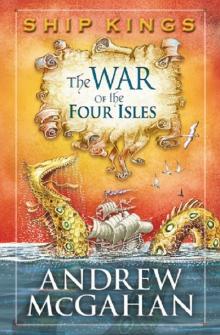 The War of the Four Isles
The War of the Four Isles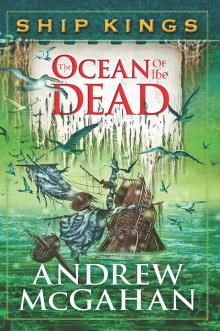 The Ocean of the Dead: Ship Kings 4
The Ocean of the Dead: Ship Kings 4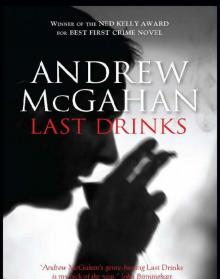 Last Drinks
Last Drinks Wonders of a Godless World
Wonders of a Godless World Underground
Underground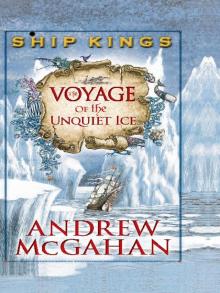 The Voyage of the Unquiet Ice
The Voyage of the Unquiet Ice